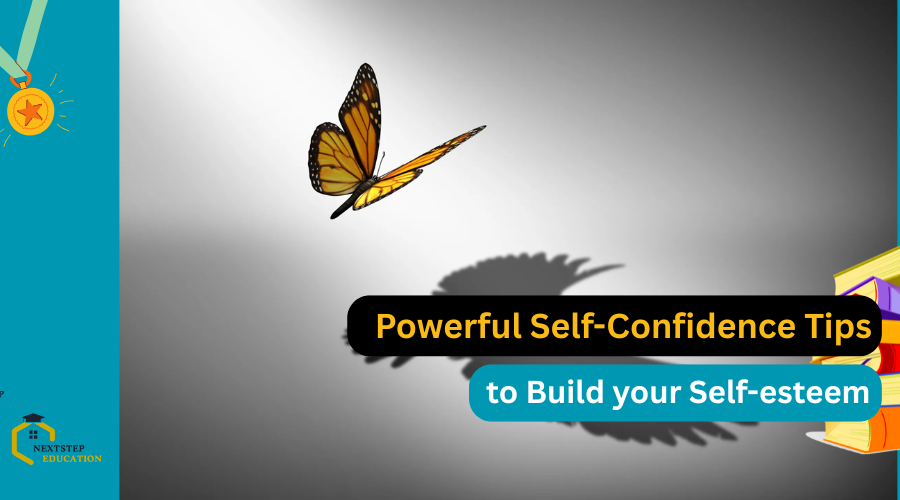Self-confidence is the belief in your capabilities, preferences, and potential. It’s the quiet internal strength that helps you speak up in class, apply for that dream job, or simply take action without fear of failure. When you feel confident, you’re more likely to take risks, handle challenges, and follow your goals with determination.
But self-confidence isn’t something people are born with—it’s a skill that can be built over time. Whether you\’re a student, professional, or just someone trying to grow personally, developing confidence can change how you think, act, and succeed.
In this blog, we’ll explore 15 powerful points about self-confidence, followed by practical strategies and habits that can help you boost it in your daily life.
15 Powerful Points on Self-Confidence
1. Believe in Your Abilities
Self-confidence begins with self-belief. You don’t need to be the best at everything—you just need to trust that you can learn, improve, and handle challenges. Confidence grows when you recognize your efforts and skills.
2. Accept and Learn from Failure
Everyone makes blunders. Confident people don’t fear failure—they treat it as feedback. Each reversal teaches you something new, making you stronger for the next step.
3. Speak Up Without Fear
Expressing your thoughts, asking questions, or sharing views builds self-assurance. The more you express yourself, the more confident you become in your ideas and presence.
4. Set and Achieve Small Goals
Confidence comes from progress. When you set realistic goals and achieve them—even small ones—you prove to yourself that you’re capable and reliable.
5. Stop Comparing Yourself to Others
Comparing yourself to others can harm your self-esteem. A confident person focuses on their growth and success, not someone else’s timeline. Your journey is yours alone.
6. Practice Positive Self-Talk
What you say to yourself matters. Replace negative thoughts like “I can’t do this” with empowering ones like “I’ll give it my best.” Confident people train their minds to be supportive, not critical.
7. Step Outside Your Comfort Zone
Growth doesn’t happen when you stay comfortable. Trying new things—even if they scare you—builds courage. Every time you take a small risk, your confidence gets stronger.
8. Focus on Your Strengths
Everyone has something they’re good at. Identify your strengths and use them often. Whether it’s creativity, problem-solving, or communication, own what makes you unique.
9. Body Language Matters
How you carry yourself affects how you feel. Standing tall, maintaining eye contact, and smiling can instantly make you feel more self-assured, and others will notice it too.
10. Be Consistent with Effort
Confidence isn’t built in a day—it grows with consistent effort. Show up for yourself, do your best regularly, and stay committed to your growth. Small wins add up over time.
11. Surround Yourself with Positive People
The company you keep influences how you see yourself. Supportive, uplifting friends or mentors help you believe in your abilities. Avoid people who constantly bring you down or make you doubt your worth.
12. Learn to Handle Criticism
Criticism is part of growth. Confident people don’t take it personally—they listen, learn, and improve. Being open to feedback shows maturity and helps you grow stronger over time.
13. Take Care of Your Body and Mind
Healthy habits—like good sleep, exercise, and nutritious food—directly impact your confidence. When you feel good physically, you’re more likely to feel mentally strong and motivated.
14. Develop a Growth Mindset
Believe that you can improve with effort and time. Instead of saying “I’m not good at this,” say “I’m still learning.” This mindset keeps you confident even when things don’t come easily.
15. Celebrate Your Progress
Take time to notice how far you’ve come. Whether it’s finishing a task, speaking in public, or just showing up—you deserve to acknowledge every step forward. Progress fuels self-confidence.
Why Self-Confidence Matters
Self-confidence is more than just “feeling good” about yourself—it shapes the way you live, learn, and lead. Confident individuals are more likely to take action, solve problems, and handle challenges without giving up. It builds the courage to speak up, try new things, and take responsibility for your growth.
Whether you\’re a student trying to do well in school, a young adult entering the workforce, or someone simply working on personal development, confidence affects every part of life. It improves communication, relationships, leadership skills, and decision-making. Most importantly, it allows you to trust yourself in any situation, even when things don’t go as planned.
That’s why self-confidence isn’t optional—it’s essential.
Proven Strategies to Build Self-Confidence
Building self-confidence takes practice and patience, but small changes in your mindset and routine can make a big difference. Here are some proven, practical strategies to help you feel more confident every day:
1. Practice Positive Self-Talk
Replace negative thoughts with encouraging ones. Instead of saying “I’m not good enough,” say “I’m learning and improving every day.”
2. Set Realistic, Achievable Goals
Start with small goals and build up. Achieving these milestones gives you a sense of accomplishment and boosts belief in your abilities.
3. Learn a New Skill
Trying something new—like public speaking, a sport, or a creative hobby—challenges your comfort zone and builds confidence through progress.
4. Face Your Fears
Avoiding situations that scare you only reinforces doubt. Instead, take small steps toward facing your fears. Every time you succeed, your confidence grows.
5. Surround Yourself with Positive Influences
Spend time with people who uplift, support, and encourage you. Avoid those who criticize or compare you unnecessarily.
6. Reflect on Your Strengths
Make a list of your achievements, skills, and qualities you’re proud of. Read it whenever self-doubt creeps in.
7. Take Care of Your Physical Health
Sleep well, eat healthy, and stay active. A healthy body supports a confident mind and improves your overall self-image.
Daily Habits That Improve Confidence
Confidence isn’t built overnight—it’s developed through small, repeated actions. These daily habits can gradually strengthen your self-esteem and help you feel more in control of your growth:
1. Start the Day with a Small Win
Make your bed, go for a short walk, or complete a quick task early in the day. Small wins set a positive tone and build momentum.
2. Maintain Good Posture
Stand tall, keep your shoulders back, and walk confidently. Body language affects how you feel and how others perceive you.
3. Speak Clearly and Make Eye Contact
Communicate with clarity and maintain eye contact while talking. These small changes improve how you express yourself and how confident you appear.
4. Keep a Success Journal
Write down one thing you did well each day. Over time, this helps you recognize your progress and builds a positive mindset.
5. Practice Gratitude
Each evening, note 2–3 things you’re grateful for. Gratitude shifts your focus from what’s missing to what’s working—and that boosts emotional strength.
6. Limit Social Media Comparison
Avoid spending too much time comparing your life with others online. Instead, focus on your goals and real-world achievements.
7. Dress Neatly and Take Care of Yourself
Looking presentable helps you feel more prepared and self-assured. It’s a simple but powerful way to boost confidence instantly.
Conclusion
Self-confidence is not a personality trait you\’re born with—it\’s a skill you build. Whether you\’re struggling with self-doubt or simply looking to grow, the journey to becoming more confident begins with small, consistent efforts. By applying the 15 points and practical strategies shared in this blog, you can strengthen your mindset, improve your daily habits, and create a more positive belief in yourself.
Remember, true confidence isn’t about being perfect—it’s about trusting yourself, learning from setbacks, and showing up every day with courage. Start where you are, keep going, and believe that you’re capable of more than you think.
Frequently Asked Questions (FAQs)
Q1. Can self-confidence be learned or improved?
Yes, absolutely. Self-confidence is a skill, not a fixed trait. With consistent effort, positive habits, and the right mindset, anyone can build and strengthen their confidence over time.
Q2. What causes low self-confidence in students or young adults?
Common causes include fear of failure, comparison with others, past negative experiences, or lack of encouragement. However, these can be overcome through self-awareness and positive reinforcement.
Q3. What is the difference between confidence and arrogance?
Confidence is based on self-belief and respect for others. Arrogance, on the other hand, comes from a need to feel superior and often lacks empathy. True confidence is humble, not boastful.
Q4. How long does it take to build self-confidence?
There’s no fixed timeline—it depends on your mindset, habits, and consistency. Some changes happen quickly, while others take time. What matters most is staying committed to growth.
Q5. Can introverts be self-confident too?
Yes. Confidence isn’t about being loud or outgoing—it’s about being comfortable with who you are. Introverts can be deeply confident, especially when they embrace their strengths and communicate authentically.





